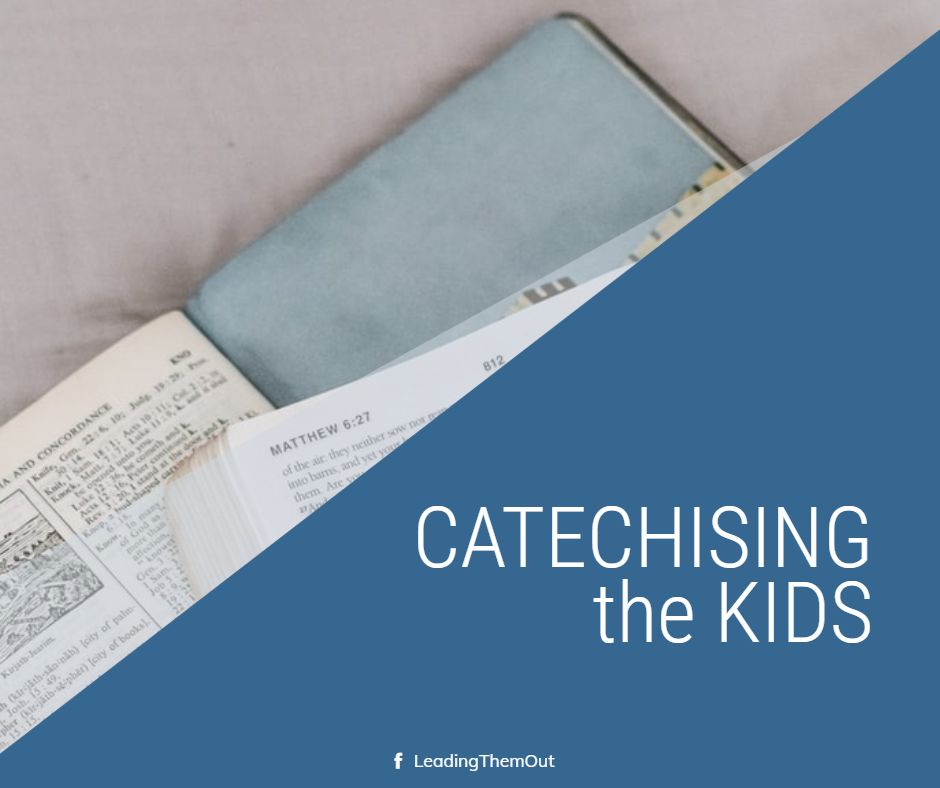Dad: ‘Who made you?’
Three-year old: ‘God made me’
Dad: ‘What else did God make?’
Three-year old: ‘God made all things’
Dad: ‘Why did God make you and all things?’
Three-year old: ‘For his own glory.’
It is morning and we are catechising our kids. I think we have been through our ‘Catechism for Boys’ and Girls’ about four times now. The older children are pretty much word perfect, as indeed am I. During the summer, I visit local skateparks each week with a couple of other Christians to speak to the young people about the Lord and I often find myself answering their questions with the words from the catechism:
Young person: ‘How do you know the Bible is true?’
Me: ‘The heavenliness of its doctrine, the unity of its parts and the power to convert the sinner’ (I then expand a bit of course!).
Once we have the children’s catechism under our belts, we intend to tackle the London Baptist Confession of 1689. While a catechism is not authoritative like Scripture, it is a guide to understanding it correctly. We are grateful to the supremely gifted men who lived before us with the learning, understanding and words to write down the tenets of our faith and we fully intend to profit from them.
If you have never thought about using a catechism with your children, here are a few reasons that might help you think it is a good idea:
1. A Catechism Lays the Foundation for Future Maturity
Our desire is that our children become mature in the Christian faith and are not as Reuben, ‘unstable as water’ (Genesis 49:4). Those of you who are familiar with classical education will understand what I mean when I write that a catechism teaches us the ‘grammar’ of our faith. The grammar stage of any area of knowledge is when the building blocks of a subject are firmly put into place, and it is upon this basic framework that future learning fits.
It is all too easy to be a Christian for years and yet to never reach maturity. Consider this exhortation from the writer of Hebrews:
‘For though by this time you ought to be teachers, you need someone to teach you again the basic principles of the oracles of God. You need milk not solid food.’ (Hebrews 6:12).
When we teach our children a catechism, we are giving them ‘pegs’ upon which to hold all future preaching and teaching. When they hear the word ‘sanctification’ in a sermon, it will hopefully mean something to them since they know that sanctification is ‘God making sinners holy in heart and conduct.’ They are better prepared to receive further teaching once we have given them a framework through which to view it.
2. A Catechism Trains Children in Discernment
Consider this statement:
Can we trust the Bible?
Yes, the Bible is all-sufficient and without error.
Any suggestion that there is a mistake in the Bible should cause our hackles to rise if we have imbibed and understood this statement. Let’s take another:
What does Christ do for his people?
He does the work of a prophet, a priest and a king (see Hebrews 1:1-3).
With one sweep we can discern why all the religions of the world are false. Any teaching that claims Jesus is only a prophet (i.e. Islam) is certain to be a false gospel. There is nothing wrong with examining the detail of other faiths to determine false teaching and heresy but a sure understanding of the person of Christ means that the heavy lifting has already been done.
3. A Catechism Places us in a Long Line of Believers.
As parents, we are not making up our Christianity as we are going along. A catechism demonstrates to our children that we are part of a defined tradition that has been passed down through the generations and that has been put into words by great theological minds. We do not leave the teaching of the Bible to random chance or an unequal emphasis but we systematically work through the major doctrines of the faith as understood by God’s servants in history. Our children can have confidence that we are part of an established tradition and that we stand in unity with many brothers and sisters in Christ.
We are confident that our faith is concrete and tangible. It is not subject to the whims and fancies of this age. We want to be able to say the Psalmist:
‘We will not hide them from their [our] children,
but tell to the coming generation
the glorious deeds of the LORD, and his might,
and the wonders that he has done.’ (Psalm 78:4)
It is for this reason that if you pop by first thing in the morning, you will find us sitting together on the sofa catechising our kids…

